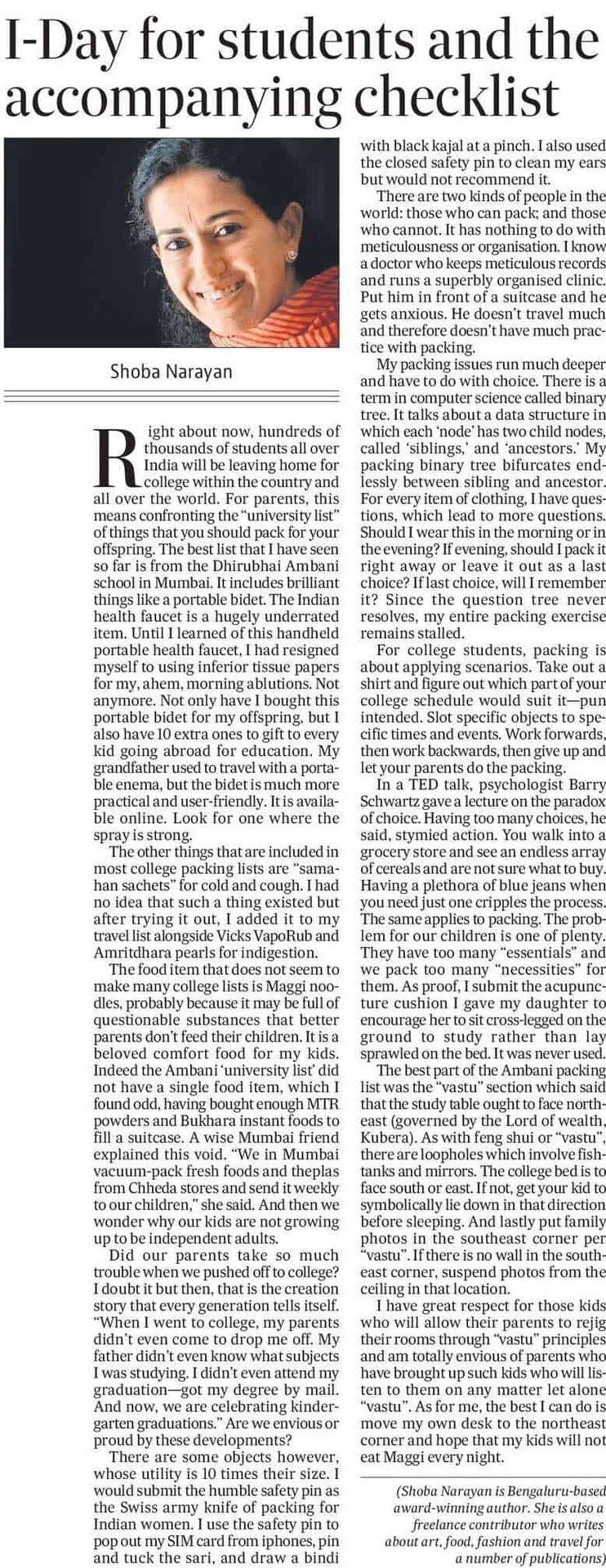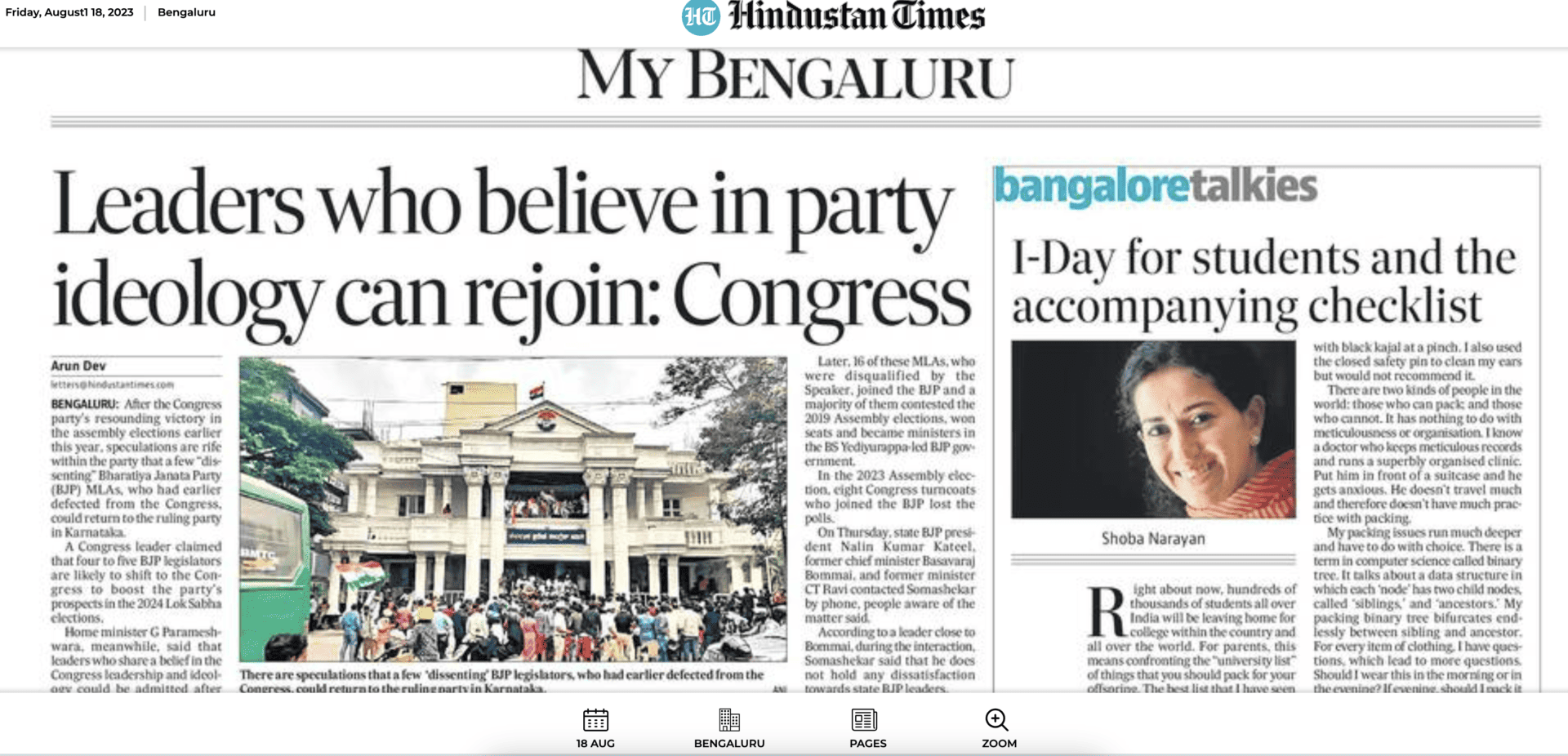Right about now, hundreds of thousands of students all over India will be leaving home for college in Indian and all over the world. For parents, this means confronting the “university list” of things that you should pack for your offspring. The best list that I have seen so far is from the Dhirubhai Ambani school in Mumbai. It includes brilliant things like a portable bidet. The Indian health faucet is a hugely underrated item. Until I learned of this handheld portable health faucet, I had resigned myself to using inferior tissue papers for my, ahem, morning ablutions. Not anymore. Not only have I bought this portable bidet for my offspring, but I also have 10 extra ones to gift to every kid going abroad for education. My grandfather used to travel with a portable enema, but the bidet is much more practical and user-friendly. It is available online. Look for one where the spray is strong.
The other things that are included in most college packing lists are “samaham sachets” for cold and cough. I had no idea that such a thing existed but after trying it out, I added it to my travel list alongside Vicks Vapourub and Amrit Dhara pearls for indigestion.
The food item that does not seem to make many college lists is Maggi noodles, probably because it may be full of questionable substances that better parents don’t feed their children. It is a beloved comfort food for my kids. Indeed the Ambani ‘university list’ did not have a single food item, which I found odd, having bought enough MTR powders and Bukhara instant foods to fill a suitcase. A wise Mumbai friend explained this void. “We in Mumbai vacuum-pack fresh foods and theplas from Chheda stores and send it weekly to our children,” she said. And then we wonder why our kids are not growing up to be independent adults.
Did our parents take so much trouble when we pushed off to college? I doubt it but then, that is the creation story that every generation tells itself. “When I went to college, my parents didn’t even come to drop me off. My father didn’t even know what subjects I was studying. I didn’t even attend my graduation—got my degree by mail. And now, we are celebrating kindergarten graduations.” Are we envious or proud by these developments?
There are some objects however, whose utility is ten times their size. I would submit the humble safety pin as the Swiss army knife of packing for Indian women. I use the safety pin to pop out my SIM card from iphones, pin and tuck the sari, and draw a bindi with black kajal at a pinch. I also used the closed safety pin to clean my ears but would not recommend it.
There are two kinds of people in the world: those who can pack; and those who cannot. It has nothing to do with meticulousness or organization. I know a doctor who keeps meticulous records and runs a superbly organised clinic. Put him in front of a suitcase and he gets anxious. He doesn’t travel much and therefore doesn’t have much practice with packing.
My packing issues run much deeper and have to do with choice. There is a term in computer science called binary tree. It talks about a data structure in which each ‘node’ has two child nodes, called ‘siblings,’ and ‘ancestors.’ My packing binary tree bifurcates endlessly between sibling and ancestor. For every item of clothing, I have questions, which lead to more questions. Should I wear this in the morning or in the evening? If evening, should I pack it right away or leave it out as a last choice? If last choice, will I remember it? Since the question tree never resolves, my entire packing exercise remains stalled.
For college students, packing is about applying scenarios. Take out a shirt and figure out which part of your college schedule would suit it—pun intended. Slot specific objects to specific times and events. Work forwards, then work backwards, then give up and let your parent do the packing.
In a TED talk, psychologist Barry Schwartz gave a lecture on the paradox of choice. Having too many choices, he said, stymied action. You walk into a grocery store and see an endless array of cereals and are not sure what to buy. Having a plethora of blue jeans when you need just one cripples the process. The same applies to packing. The problem for our children is one of plenty. They have too many “essentials” and we pack too many “necessities” for them. As proof, I submit the acupuncture cushion I gave my daughter to encourage her to sit cross-legged on the ground to study rather than sprawling on the bed. It was never used.
The best part of the Ambani packing list was the “vasthu” section which said that the study table ought to face North-east (governed by the Lord of wealth, Kubera). As with feng shui or vasthu, there are loopholes which involve fish-tanks and mirrors. The college bed is to face south or east. If not, get your kid to symbolically lie down in that direction before sleeping. And lastly put family photos in the Southeast corner per vasthu. If there is no wall in the southeast corner, suspend photos from the ceiling in that location.
I have great respect for those kids who will allow their parents to rejig their rooms through Vasthu principles and am totally envious of parents who have brought up such kids who will listen to them on any matter let alone vasthu. As for me, the best I can do is move my own desk to the northeast corner and hope that my kids will not eat Maggi every night.
Shoba Narayan is Bangalore-based award-winning author. She is also a freelance contributor who writes about art, food, fashion and travel for a number of publications.



-k4lD-U204025897261YmH-250x250%40HT-Web.jpg)




Leave A Comment